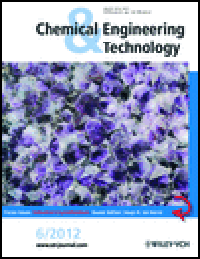
CHEMICAL ENGINEERING & TECHNOLOGY
Scope & Guideline
Pioneering Insights in Chemical Engineering Excellence
Introduction
Aims and Scopes
- Chemical Process Engineering:
The journal covers various aspects of chemical process engineering, including design, optimization, and control of chemical processes. It emphasizes innovative methodologies and technologies to improve efficiency and sustainability. - Materials Science and Engineering:
Research on materials, particularly those relevant to chemical engineering applications, such as catalysts, membranes, and nanomaterials, is a core focus. The journal highlights the development and characterization of new materials. - Energy Systems and Sustainability:
The journal addresses energy production and conversion technologies, including renewable energy sources and energy-efficient processes. It promotes research aimed at sustainability and reducing the environmental impact of chemical processes. - Environmental Engineering and Waste Management:
This scope includes studies on pollution control, waste treatment technologies, and sustainable practices in chemical engineering to minimize environmental impacts. - Computational Methods and Modeling:
The use of computational tools, such as computational fluid dynamics (CFD) and machine learning, for modeling and simulating chemical processes is a significant part of the journal's focus, aiding in the understanding and optimization of complex systems. - Biochemical Engineering:
Research in biochemical processes, including biofuels, bioremediation, and fermentation technologies, is included, reflecting the integration of biological principles in chemical engineering.
Trending and Emerging
- Sustainable Chemical Processes:
There is a growing emphasis on sustainability in chemical processes, including green chemistry, waste valorization, and resource recovery, reflecting an industry-wide shift towards environmentally friendly practices. - Advanced Materials for Energy Applications:
Research into advanced materials, particularly for energy storage and conversion applications (such as batteries and fuel cells), is increasingly prevalent, driven by the demand for efficient and sustainable energy solutions. - Carbon Capture and Utilization Technologies:
Emerging technologies for carbon capture and utilization (CCU) are gaining attention, focusing on innovative approaches to mitigate climate change by converting CO2 into valuable products. - Digitalization and Industry 4.0:
The integration of digital technologies, including machine learning, the Internet of Things (IoT), and big data analytics, in chemical engineering processes is a rapidly growing area, aimed at optimizing operations and enhancing decision-making. - Biotechnology and Bioengineering:
Research in biotechnology, particularly in the context of biofuels, bioprocessing, and bioremediation, is becoming increasingly important, reflecting a broader trend towards biological solutions in chemical engineering. - Nanotechnology in Chemical Engineering:
The application of nanotechnology in various chemical engineering fields, including catalysis, material science, and environmental engineering, is on the rise, driven by the unique properties and functionalities of nanomaterials.
Declining or Waning
- Traditional Chemical Engineering Processes:
There appears to be a decline in papers focusing on conventional chemical engineering processes without innovative modifications or sustainability considerations. This reflects a trend towards more advanced, integrated approaches. - Single-Use Technologies:
The interest in single-use technologies, which gained traction in earlier years, is waning as the industry shifts focus to more sustainable and reusable systems. - Basic Reaction Kinetics Studies:
There is a noticeable decrease in the publication of studies solely focused on basic reaction kinetics without a practical application or integration into larger systems, as the field moves towards applied research with direct industrial implications. - Conventional Wastewater Treatment Methods:
Research on traditional wastewater treatment processes is declining in favor of innovative and integrated approaches, such as advanced oxidation processes and bioremediation, which are more aligned with current sustainability goals.
Similar Journals

CHEMICAL AND PETROLEUM ENGINEERING
Pioneering Discoveries in Chemical and Petroleum SciencesChemical and Petroleum Engineering is a prestigious academic journal dedicated to the advancement of knowledge in the fields of chemical engineering and petroleum technologies. Published by Springer, this journal serves as a vital resource for researchers, professionals, and students interested in the intricate processes and innovations that drive these industries. With an ISSN of 0009-2355 and an E-ISSN of 1573-8329, it has established a notable presence since its inception in 1965. Throughout its converged years, the journal has continually published impactful research that contributes to sustainability and efficiency within the sectors. Although it holds a Q3 ranking in Chemical Engineering and Fuel Technology and a Q4 ranking in Energy Engineering and Geochemistry, it is a noteworthy platform for emerging studies, fostering connections among scholars. Readers will find a wealth of information and ideas, but please note that this journal does not currently offer open access options. For those passionate about chemical and petroleum engineering, this journal is an essential part of staying informed and engaged with the latest scientific advancements.
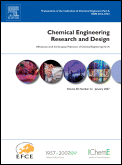
CHEMICAL ENGINEERING RESEARCH & DESIGN
Elevating Research Standards in Chemical Engineering.CHEMICAL ENGINEERING RESEARCH & DESIGN is a prestigious journal that has been at the forefront of dissemination in the fields of chemical engineering and general chemistry since its inception in 1983. Published by Elsevier, the journal features a rich array of research articles that contribute to both theoretical and practical advancements in the discipline. With an impact factor that positions it strongly within the Q2 quartile for both Chemical Engineering and Chemistry categories, it occupies an esteemed place in the academic community, being ranked #77 out of 273 in Chemical Engineering and #111 out of 408 in General Chemistry on Scopus. Researchers and professionals will find it an invaluable resource for cutting-edge research and innovative methodologies that shape the future of chemical engineering applications. While the journal does not currently offer open access, it remains accessible through institutional subscriptions, ensuring that important findings continue to reach a broad audience. With a scope that is poised to expand through 2024, the journal aims to foster collaboration and knowledge sharing, supporting the continuous evolution of the field.
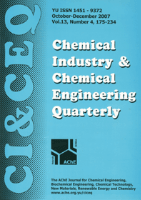
Chemical Industry & Chemical Engineering Quarterly
Bridging Theory and Practice in Chemical Engineering.Chemical Industry & Chemical Engineering Quarterly is a distinguished, open-access journal published by ASSOC CHEMICAL ENG that serves as a vital platform for innovative research within the field of chemical engineering. Established in 2000 and actively disseminating knowledge since then, this journal has garnered acknowledgment for its contribution to the field, currently being ranked in the third quartile (Q3) of Chemical Engineering (Miscellaneous) for 2023. With a focus on advancing understanding of chemical processes and facilitating the integration of industry operations with engineering principles, it provides a forum for both theoretical and applied research. The journal is committed to maintaining high standards of academic rigor, supported by its indexed presence in Scopus, where it ranks #173 out of 273 in the general chemical engineering category. As an open-access journal, it promotes the rapid dissemination of research findings, enhancing accessibility for scholars, professionals, and students worldwide. Based in Serbia, the journal is an essential resource for those seeking to stay at the forefront of chemical engineering advancements.

Korean Chemical Engineering Research
Exploring Innovations in Chemical EngineeringKorean Chemical Engineering Research, published by the Korean Institute of Chemical Engineers, serves as a vital resource for those engaged in the expansive field of chemical engineering. With an ISSN of 0304-128X and an E-ISSN of 2233-9558, the journal offers a platform for scholarly articles that cover various aspects of chemical processes, innovative technologies, and sustainability practices in engineering. Despite being in the Q4 category of chemical engineering journals as per the 2023 rankings, the journal's focus on emerging research from South Korea and beyond presents unique insights valuable to professionals, researchers, and students alike. Operating under effective citation metrics, it finds its place within Scopus, ranking at 229 out of 273, indicating a niche yet specialized contribution to the broader scientific community. We invite you to explore this integral journal, which is committed to fostering discourse and development in chemical engineering through its extensive archive, dating back to 2014 and continuing to evolve through 2023.
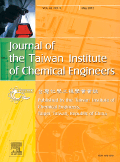
Journal of the Taiwan Institute of Chemical Engineers
Advancing chemical engineering through innovative research.The Journal of the Taiwan Institute of Chemical Engineers is a prestigious publication in the field of chemical engineering and chemistry, published by Elsevier. With an impressive impact factor placing it in the top quartiles (Q1) of both the Chemical Engineering (miscellaneous) and Chemistry (miscellaneous) categories, this journal serves as a vital platform for disseminating cutting-edge research and innovative findings. Since its inception in 2009 and continuing through 2024, it has established a strong reputation with notable Scopus rankings—ranked 40th out of 273 in General Chemical Engineering and 62nd out of 408 in General Chemistry, reflecting the journal’s significance in its field. By offering open access options, the journal ensures that research is readily available to a global audience, fostering collaboration and knowledge exchange among researchers, professionals, and students. The Journal of the Taiwan Institute of Chemical Engineers is dedicated to advancing the discipline of chemical engineering and supporting the development of novel scientific methodologies and applications.
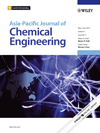
Asia-Pacific Journal of Chemical Engineering
Fostering Interdisciplinary Research for a Sustainable Future.The Asia-Pacific Journal of Chemical Engineering, published by WILEY, serves as a vital forum for the dissemination of innovative research in the interdisciplinary domains of chemical engineering, renewable energy, sustainability, and waste management. Established in 2006, this esteemed journal has achieved a notable impact factor that reflects its commitment to advancing knowledge and practices within the chemical engineering community. With its Q3 category rankings across various fields, including Chemical Engineering (Miscellaneous), Renewable Energy, Sustainability and the Environment, and Waste Management and Disposal, the journal holds a significant position among its peers, assuring readers of quality and relevance in published content. Although it does not offer Open Access options, the Asia-Pacific Journal of Chemical Engineering remains an essential resource for researchers, professionals, and students aiming to stay at the forefront of innovations affecting the Asia-Pacific region and beyond. The journal's broad scope covers diverse topics, making it an integral part of the academic landscape from 2006 to 2024.

Frontiers in Chemical Engineering
Advancing the Frontiers of Chemical InnovationFrontiers in Chemical Engineering is an esteemed open-access journal published by Frontiers Media SA, dedicated to advancing knowledge in the dynamic field of chemical engineering. Since its inception in 2019, this journal has rapidly gained recognition for its rigorous peer-reviewed articles and innovative research contributions, achieving notable quartile rankings such as Q2 in Chemical Engineering and Q3 in both Bioengineering and Catalysis by 2023. With an emphasis on providing accessible and cutting-edge research, the journal caters to a diverse audience of researchers, professionals, and students interested in the latest developments and methodologies within the chemical engineering discipline. Hailing from Lausanne, Switzerland, Frontiers in Chemical Engineering embodies a commitment to enhancing collaborative scientific communication, making crucial research findings available without barrier. By publishing high-quality articles that address both theoretical advancements and practical applications in chemical engineering, this journal serves as a pivotal resource for fostering innovation and collaboration across the global research community.

KAGAKU KOGAKU RONBUNSHU
Unveiling New Horizons in Chemical Processes and MaterialsKAGAKU KOGAKU RONBUNSHU is a distinguished journal published by the SOC CHEMICAL ENG JAPAN, focusing on the interdisciplinary realms of chemical engineering and chemistry since its inception in 1975. With a commitment to advancing knowledge in these fields, the journal has established itself as a critical forum for researchers, professionals, and students alike, contributing to the understanding and application of chemical processes and materials sciences. Although it operates under a traditional publication model, the journal garners attention within the academic community, reflected in its Q3 rankings in both Chemical Engineering and Chemistry categories as of 2023. With the journal's ISSN 0386-216X and a comprehensive coverage spanning nearly five decades, it remains an essential resource for contemporary chemical research and developments, addressing ongoing challenges and innovative solutions in various applications. The journal invites submissions that reflect the latest advancements and insights in these fields, striving to foster a vibrant academic dialogue and support future innovations.

Engineering Review
Connecting researchers for impactful engineering solutions.Engineering Review is a prominent academic journal published by the University of Rijeka, Faculty of Engineering in Croatia. As an emerging outlet in the field of engineering, the journal has been providing a platform for interdisciplinary research since its inception in 2011, with a commitment to disseminating high-quality studies up to the horizon of 2024. Although currently categorized as Q4 in the Engineering (miscellaneous) section and ranking 242 out of 307 in General Engineering per Scopus metrics, the journal aims to bolster its impact and reach within the engineering community. With a focus on innovative approaches and practical applications in various engineering disciplines, Engineering Review invites contributions from researchers, professionals, and students alike, fostering a collaborative environment for the advancement of engineering research in a global context. While it is not an open-access journal at this time, it remains a vital resource for those engaged in cutting-edge engineering endeavors.

Eurasian Chemico-Technological Journal
Fostering Innovation Across Borders in Chemico-Technological ResearchEurasian Chemico-Technological Journal, published by the Institute of Higher Education Academy of Sciences in Kazakhstan, serves as a dynamic platform for scholars and professionals engaged in the interdisciplinary fields of chemical engineering, chemistry, condensed matter physics, and materials science. Since its inception in 1999, the journal has embraced an open access model, enabling broad dissemination of research findings and fostering collaborative innovation across borders. With an ISSN of 1562-3920 and a converged publication schedule extending from 2007 to 2024, it continues to contribute to the global academic dialogue, despite its current standing in Q4 quartiles across several categories on Scopus. The journal ranks in the lower percentiles within its respective fields, yet it remains a valuable resource for emerging research and perspectives within the scientific community. This journal is essential for both seasoned researchers and students, as it reflects the evolving landscape of chemico-technological research while promoting engagement with contemporary issues in the sciences.